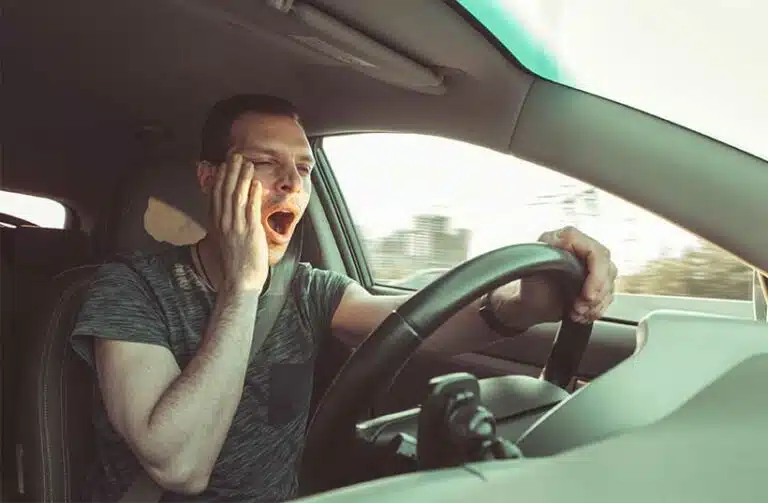Study Finds THC More Common Than Alcohol In Serious Or Fatal Car Crashes
- Cannabinoids & Injured Roadway Users
- How THC Contributes To Car Crashes
- How To Avoid THC-Related Car Crashes
- Is Marijuana Addictive?

When you hear the phrase “driving under the influence,” you probably think of alcohol. Indeed, in the United States, about 32 people die in alcohol-related car crashes every day.
However, alcohol is not the only drug causing car accidents. A recent study shows that THC (the main psychoactive ingredient in marijuana) contributes to even more crashes than alcohol.
Cannabinoids & Injured Roadway Users
In January 2020, researchers at the University of Massachusetts Chan Medical School began an 18-month study of seriously or fatally injured roadway users at trauma centers across the United States.
They examined blood specimens from over 7,200 roadway users, including vehicle users, bicyclists, and pedestrians. Researchers published their findings in a report for the National Highway Traffic Safety Administration (NHTSA).
According to the report, almost 56% of seriously or fatally injured roadway users tested positive for one or more drugs. The most commonly detected drugs were cannabinoids (25.1%), followed by alcohol (23.1%).
Cannabinoids are substances found in the cannabis (marijuana) plant. The most common cannabinoid is tetrahydrocannabinol, or THC. THC is the ingredient in marijuana that makes you feel high.
How THC Contributes To Car Crashes
Like alcohol, THC impacts your physical and psychological functioning. It can cause a variety of effects that make you an unsafe driver, including:
- poor judgment
- difficulty concentrating and making decisions
- memory issues
- poor balance and coordination
- slowed reaction times
As more states legalize marijuana, more people are using the drug while driving. Some drivers might not realize that marijuana can be just as dangerous as alcohol. While the dangers of drunk driving have been highlighted for decades, there is far less information about driving while high on marijuana.
How To Avoid THC-Related Car Crashes
If you have been using marijuana, don’t drive until you wait long enough for the effects of THC to fade. The exact amount of time you should wait depends on how much THC you consumed and how you consumed it (for example, by smoking marijuana or eating a marijuana edible).
According to the Colorado Department of Transportation, if you smoke marijuana that contains less than 35 milligrams of THC, you should wait at least 6 hours before driving, biking, or performing other dangerous activities. If you smoke more than 35 milligrams of THC, you should wait even longer.
If you eat or drink products containing less than 18 milligrams of THC, you should wait at least 8 hours before driving, biking, or performing other dangerous activities. If you eat or drxink more than 18 milligrams of THC, or if you have mixed the THC with alcohol, you should wait even longer.
Finally, make sure that all of your friends understand the risks of driving under the influence of marijuana or other drugs. Whenever you and your friends use marijuana, alcohol, or other substances, remember to choose a designated driver. This person will remain sober for the night so they can safely drive your group around.
If you feel unable to stop using marijuana while driving, you may have marijuana addiction.
Marijuana Addiction
Marijuana addiction (also called marijuana use disorder) is a serious disease that makes you feel unable to control your marijuana use.
According to the National Institute on Drug Abuse (NIDA), about 30% of people who use marijuana develop some level of marijuana use disorder. The most common symptoms are tolerance and physical dependence.
Tolerance means that over time, you need increasingly larger or more frequent amounts of marijuana to feel the desired effects. Physical dependence means your body starts relying on marijuana to function normally.
If you stop using it, you may experience withdrawal symptoms such as:
- mood swings
- irritability
- restlessness
- trouble sleeping
- marijuana cravings
- reduced appetite
- headache
- abdominal pain
- nausea and vomiting
- sweating
- tremors
Other symptoms of marijuana addiction may include loss of motivation, loss of interest in activities once enjoyed, and decline in personal hygiene.
Marijuana Addiction Treatment
If you think you or someone you love may have a marijuana addiction, seek help at a substance abuse treatment program. These inpatient and outpatient programs offer evidence-based treatments such as:
- medical detox, in which doctors help you manage withdrawal symptoms as you get marijuana out of your system
- mental health counseling, in which a therapist helps you manage marijuana cravings and any mental health concerns that may have led you to misuse marijuana in the first place
- support groups, in which you can discuss your experiences with other people recovering from marijuana addiction
To learn more about marijuana addiction treatment, please reach out to an Ark Behavioral Health specialist. Our board-certified treatment providers offer personalized, comprehensive care to help you or your loved one stay healthy.
Written by Ark Behavioral Health Editorial Team
©2024 Ark National Holdings, LLC. | All Rights Reserved.
This page does not provide medical advice.
Centers for Disease Control and Prevention - Marijuana and Driving: How to Keep Your Fleet’s Drivers Safe
Colorado Department of Transportation - How long should I wait to drive after getting high?
National Highway Traffic Safety Administration - Drunk Driving
National Institute on Drug Abuse - Is marijuana addictive?
University of Massachusetts Chan Medical School - UMass Chan researchers contribute to study of drug prevalence among injured road users

Questions About Treatment?
Ark Behavioral Health offers 100% confidential substance abuse assessment and treatment placement tailored to your individual needs. Achieve long-term recovery.
100% confidential. We respect your privacy.
Prefer Texting?
Our friendly support team is here to chat 24/7. Opt out any time.







 Learn More
Learn More








